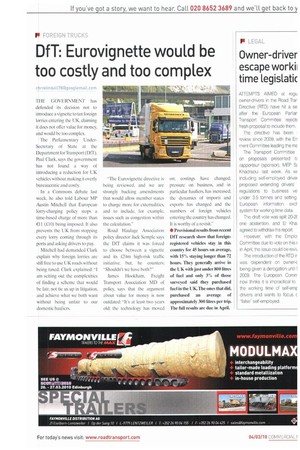DfT: Eurovignette would be too costly and too complex
Page 11

If you've noticed an error in this article please click here to report it so we can fix it.
christindatt78fagoogtemail.com THE GOVERNMENT has defended its decision not to introduce a vignette to tax foreign lorries entering the I JK, claiming it does not offer value for money, and would be too complex.
The Parliamentary UnderSecretary of State at the Department for Transport ( DfT). Paul Clark, says the government has not found a way of introducing a reduction for UK vehicles without making it overly bureaucratic and costly.
In a Commons debate last week, he also told Labour MP Austin Mitchell that European lorry-charging policy stops a time-based charge of more than El I (110) being imposed. It also prevents the UK from stopping every lorry coming through its ports and asking drivers to pay.
Mitchell had demanded Clark explain why foreign lorries are still free to use UK roads without being taxed. Clark explained: "I am setting out the complexities of finding a scheme that would be fair. not tie us up in litigation. and achieve what we both want without being unfair to our domestic hauliers. "The Eurovigneite directive is being reviewed, and we are strongly backing amendments that would allow member states to charge more for externalities. and to include, for example, issues such as congestion within the calculation."
Road Haulage Association policy director Jack Semple says the MT claims it was forced to choose between a vignette and its £24m high-risk traffic initiative, but, he counters: "Shouldn't we have both?"
James Hookham, Freight Transport Association MD of policy, says that the argument about value for money is now outdated: "It's at least two years old: the technology has moved on; costings have changed: pressure on business, and in particular hauliers. has increased: the dynamics of imports and exports has changed and the numbers of foreign vehicles entering the country has changed. It is worthy of a revisit."
• Provisional results from recent DfT research show that foreignregistered vehicles stay in this country for 45 hours on average, with 15% staying longer than 72 hours. They generally arrive in the UK with juts( under 800 litres of fuel and only 3% of those surveyed said they purchased fuel in the UK. The ones that did. I purchased an average of approximately 300 litres per trip. The full results are due in April.
































































































































